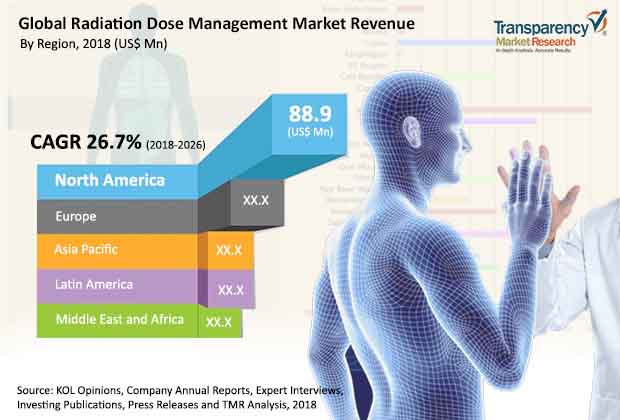Transparency Market Research has published a new report titled, “Radiation Dose Management Market – Global Industry Analysis, Size, Share, Growth, Trends, and Forecast, 2018–2026”. According to the report, the global radiation dose management market was valued at US$ 143.2 Mn in 2017 and is projected to expand at a CAGR of 26.7% from 2018 to 2026 to reach US$ 1,361.5 Mn in 2026. Rise in prevalence of chronic diseases such as cardiovascular and cancer, increase in geriatric population, growing safety concerns and improving quality of patient care, surge in demand for medical imaging, emerging economies in Asia Pacific, Latin America, and Middle East & Africa, and technological advancements are expected to propel the global radiation dose management market during the forecast period.

Increase in Usage of Integrated Software Systems
Owing to increasing number of chronic diseases such as cardiovascular, cancer and increasing demand for medical imaging in diagnosis of these diseases, compiled with the prime intent of updating the stakeholders with the unavoidable market parameters through a graphical illustration and in-depth analysis of each segment considered within the study scope. Increase in government funding to setup high quality health care infrastructure is anticipated to propel the market during the forecast period. Rise in usage of integrated software in medical imaging devices which enables the interlinking of various images and databases is expected to augment the market. Surge in funding from government and private sector for oncology treatment in terms of reimbursement is likely to contribute to the growth of the market. Increase in government programs to prevent high radiation dose is projected to propel the market during the forecast period.
Get Brochure of the Report @ https://www.transparencymarketresearch.com/sample/sample.php?flag=B&rep_id=25394
Computed Tomography Held Major Market Share
In terms of modality, the computed tomography segment accounted for major market share in 2017. Growth of the segment is attributed to increase in number of diseases and requirement of CT scan for diagnosis of these diseases. The radiography and mammography segment is likely to be driven by increase in application in the diagnosis and treatment analysis of cancer at various stages and in the diagnosis of orthopedic, dental, and chronic conditions such as pneumonia.
Rise in Cancer Cases across the Globe
In terms of application, the oncology segment held the major market share in 2017 and the trend is projected to continue during the forecast period. Growth of the segment is attributed to increasing number of cancer cases. Moreover, according to WHO report, cancer is expected to account for 70% of global deaths in the next two decades. Surge in the number of orthopedic cases and usage of different imaging techniques during the course of the treatment are likely to fuel the growth of the segment.
Request For Covid19 Impact Analysis – https://www.transparencymarketresearch.com/sample/sample.php?flag=covid19&rep_id=25394
Hospitals Segment Dominates Market
The hospitals segment accounted for the largest share of the market in 2017. The predominance of the market share of the hospitals segments over other segments is because, hospital pharmacy is mostly preferred by patients owing to the fact that all types of diagnosis is widely available in hospitals as compared to others. Additionally, increasing incidence of chronic diseases such as cancer, cardiovascular diseases are well treated in the hospitals. Initiatives by government bodies to develop health care infrastructure and to attract women are projected to propel the hospitals segment. Ambulatory centers contribute less for the growth radiation dose monitoring market, due to high installment cost of medical devices which is a restraining factor for the clinics to provide this facility
Asia Pacific to Witness Exponential Growth
Asia Pacific is projected to be the fastest growing market for radiation dose management during the forecast period owing to increase in incidence of chronic diseases and rise in awareness about diagnosis, especially in China and Japan. Moreover, surge in investments to enhance the adoption of health care IT technologies in countries such as India and Australia drives demand for radiation dose management solutions. North America held major share of the global radiation dose management market in 2017, attributed to well-established health care infrastructure, presence of key players, and favorable reimbursement policy. Moreover, incidence of cancer, cardiovascular diseases, and neurological disorders is increasing in North America which require imaging tests for diagnosis. Emerging markets such as Latin America and Middle East & Africa are also likely to witness strong growth due to the emergence of key players in these regions and increase in incidence of diseases.
Read our Case study at : https://www.transparencymarketresearch.com/casestudies/innovative-medical-device-manufacturing-start-up
Afga-Gevaert N.V., Bayer Healthcare AG, Koninklijke Philips N.V., GE Healthcare, Thermo Fisher Scientific, and Fujifilm Holdings Corporation to Lead the Market
Key players operating in the global radiation dose management market are Landauer, Inc., Spectra AB, Agfa-Gevaert N.V., INFINITT Healthcare Co. Ltd., Bayer AG, PACSHealth, LLC, Koninklijke Philips N.V., GE Healthcare, Thermo Fisher Scientific, Fujifilm Holdings Corporation, and QAELUM NV.
More Trending Reports by Transparency Market Research – 1. https://www.prnewswire.com/news-releases/global-radiation-therapy-market-to-reach-us-8-6-bn-by-2026–product-approvals-to-drive-growth-transparency-market-research-300998453.html